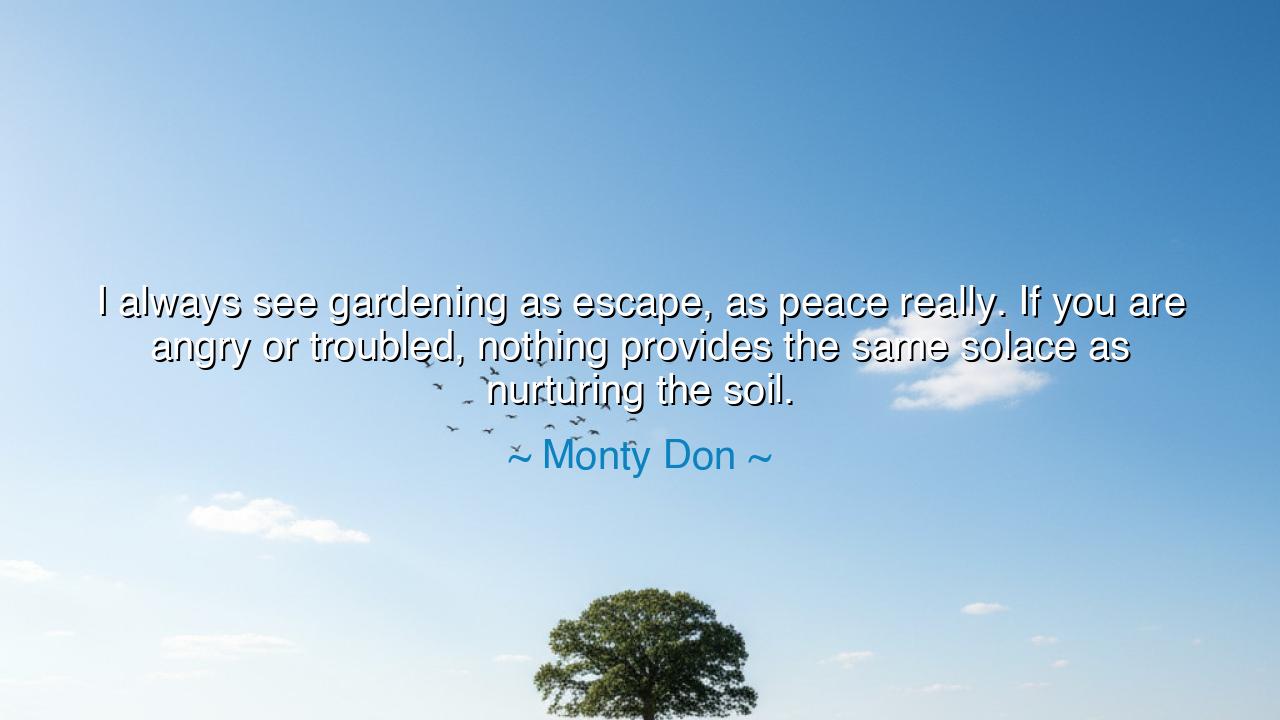
I always see gardening as escape, as peace really. If you are
I always see gardening as escape, as peace really. If you are angry or troubled, nothing provides the same solace as nurturing the soil.






Hear these words of quiet power from Monty Don, the gardener-poet of our time: “I always see gardening as escape, as peace really. If you are angry or troubled, nothing provides the same solace as nurturing the soil.” In these few words, simple yet profound, lies a truth as old as humanity itself — that the healing of the heart begins in the earth, that to touch the soil is to touch the eternal rhythm of life. For when the spirit is restless and the mind storms with grief or anger, it is not words or wealth that mend us, but the silent labor of creation — the turning of soil, the tending of green things, the return to nature’s heartbeat.
The origin of this wisdom reaches far beyond our modern gardens. From the dawn of civilization, people have turned to the land not merely to survive, but to find balance. The ancient Persians built gardens they called pairidaeza — “enclosed paradise” — where man and nature could dwell in harmony. To walk among those ordered groves was not leisure but prayer. The same spirit breathes in Monty Don’s words. His escape is not flight from the world, but return to what the world has forgotten: the sacred peace that dwells in patient work and quiet growth.
For the one who tends the soil learns humility. No anger survives long when faced with the slowness of a seed, the stubbornness of roots, or the tender unfolding of a bud. The hands that dig into the earth also dig into the self, loosening the hardened clods of sorrow and pride. As one sows, one confesses; as one waters, one forgives. This is the secret solace that Monty Don speaks of — the gentle alchemy by which pain is transformed into peace through contact with the living world.
Think of Marcus Aurelius, emperor and philosopher, who ruled a vast empire yet found his calm not in power, but in stillness. When his duties grew heavy and his heart wearied of war, he turned inward — not to riches, but to contemplation of the natural order. “Look at the leaves,” he wrote, “how they fall with grace, how they return to the soil.” In this reflection lies the same truth as Monty Don’s: that in observing and tending the cycle of life, the human soul finds rest. The emperor of Rome and the gardener of England share the same cure — the earth, constant and forgiving.
And there is the tale of Nelson Mandela, who, imprisoned for decades, kept a small garden within the walls of Robben Island. In that barren place of cruelty, he nurtured tomatoes and herbs with patient devotion. To others it was a pastime; to him it was escape. “The sense of being the custodian of this small patch of earth,” he later wrote, “offered me a small taste of freedom.” Thus, even behind bars, the soil gave him dignity, hope, and peace. The hands that could not break their chains could still tend to life — and in doing so, they remained unbroken.
When Monty Don speaks of the garden as peace, he speaks not of idleness but of sacred labor — work that heals rather than wounds. The garden is the mirror of the soul: if it is neglected, weeds of bitterness grow; if it is cared for, beauty returns. To nurture the earth is to remind oneself that all life responds to kindness, patience, and love. Even in times of anger, to lay one’s hands upon the soil is to remember that creation is stronger than destruction, and growth more enduring than grief.
Thus, the lesson is clear: when the mind is troubled, do not flee into noise or distraction. Go instead to the garden, or any place where life still breathes quietly. Touch the soil. Plant something small — a seed, a dream, a hope. Let the rhythm of nature slow your racing heart. In the patience of growth, in the humility of care, you will find your peace.
And so, dear listener, remember this: the world outside may wound you, but the earth beneath your feet will always welcome you home. When you are angry, go to the garden. When you are lost, go to the garden. When you are weary of mankind, go to the garden — and there, in the silent conversation between hand and soil, you will rediscover yourself. For the soil does not judge; it only transforms.






AAdministratorAdministrator
Welcome, honored guests. Please leave a comment, we will respond soon